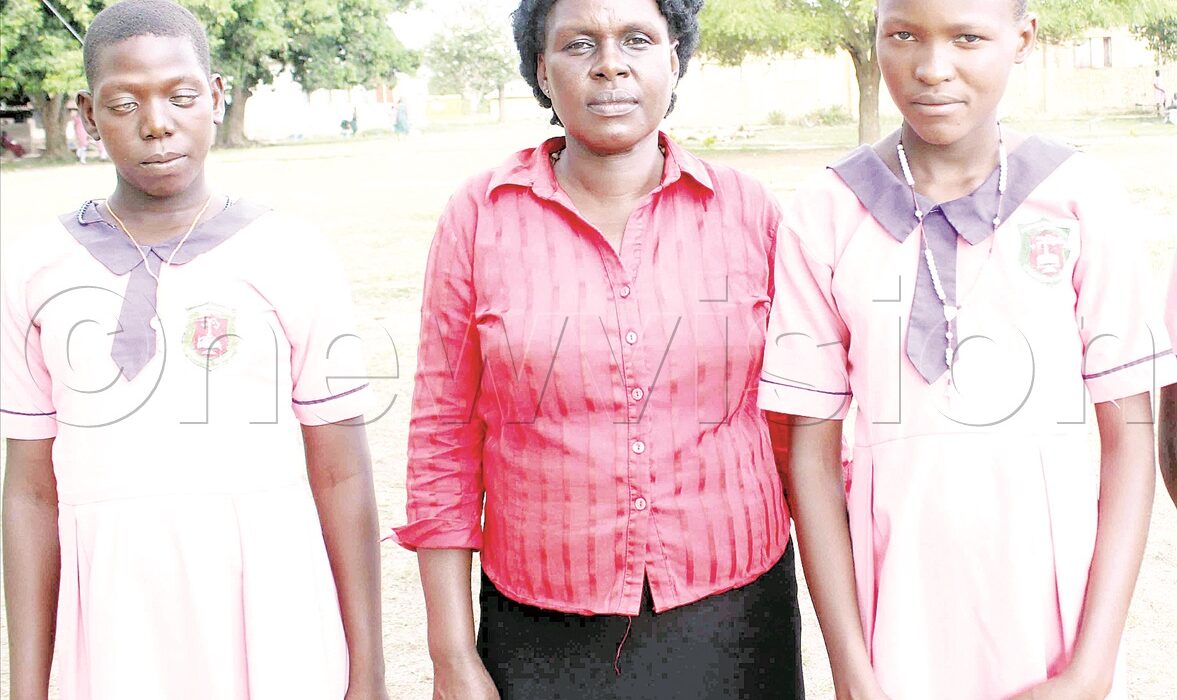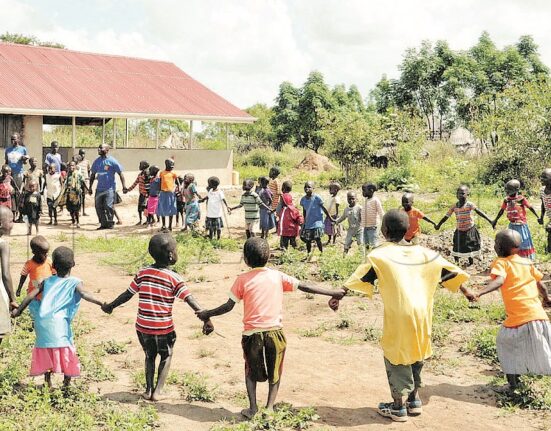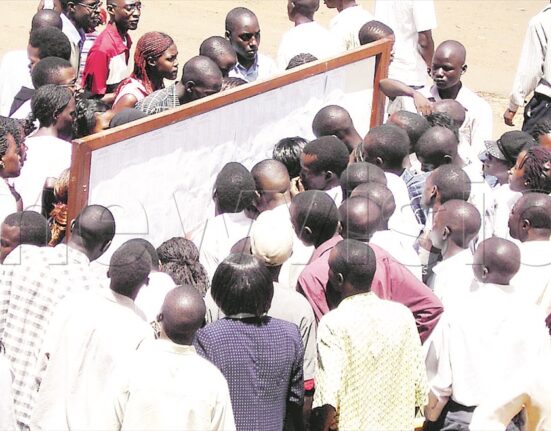(This article was first published in the New Vision on August 3, 2022)
By Michael Onyinge
Days after the Government lifted the stay-at-home restrictions, two girls showed up at Lwala Girls’ Primary School in Kalaki district with an urgent need. They had used up the sanitary products they carried with them back home when the schools were shut down in March 2020.
Luckily, the headteacher, Susan Agemo, was at the school at the time. Because Agemo thought many more girls would come to the school with the same need, she asked the two girls to work with her to make reusable sanitary products.
A few days later, Agemo says, 10 more girls who had also run out of sanitary towels, showed up at the school located in Otuboi sub-county and asked to join the two girls in making the products.
“Some parents failed to get their children sanitary pads during the lockdown. It is one of the things that worried me as schools closed and I decided to stay at school because I knew these girls would need help,” Agemo, who says the girls made the sanitary pads from fabrics, adds.
She explains that 112 girls received the sanitary products which were produced during the lockdown.
During the lockdown, Agemo says she received learning materials to distribute to learners. However, the materials were not enough, so Agemo facilitated the teachers, who photocopied and distributed them to 85 pupils who were within their reach.
When Government announced that the schools would reopen in January, Agemo says she attended several church services and funeral ceremonies to appeal to the parents to prepare their children to return to school.
“I always asked for an opportunity to speak so as to remind the parents to send their children back to school,” Agemo, who also put notices on commercial buildings in major trading centres announcing the schools reopening, says.
Challenges
However, there were other challenges. Many of the teachers had set up small businesses, which they did not want to close to return to school. In addition, the school did not have money to buy scholastic materials, sanitiser and masks, as well as set up hand washing facilities.
Agemo says she contacted the teachers separately, urging each one of them to find people to manage their businesses so they could return to school.
“The teachers returned two weeks before the schools reopened. I was lent money to buy items such as sanitiser and masks for teachers and some students, as well as set up hand-washing facilities,” she adds.
Agemo also secured 11 temperature guns to allow teachers and the guard at the school’s entrance to take students’ temperatures before allowing them to enter the school.
“I convened two staff meetings before the schools reopened to find money for these items. I wanted to keep the children in school safe and prevent the virus from getting in, which might have led to the reclosing of schools,” she states.
Agemo says she has asked the school’s administration to give bursaries to two girls who nearly dropped out as their parents could not pay some of the school dues and buy them scholastic materials. She explains that she sponsors a girl who almost dropped out as well because her parents failed to finance her education.
Agemo says she also encouraged three girls who had been married off by their parents to return to school.
“I was helped by many people to be able to get to where I am today, and that is why I make an effort to support other girls. Without the support of those people, I would have dropped out,” she says.

Practical Agriculture Skills
Agemo runs a demonstration garden to enable pupils learn practical farming and aid the teaching of the science subject.
“It has helped the children to learn a lot of skills, such as mulching, crop management and production. These are also skills I would like them to take advantage of in the future and become productive,” she says.
The garden, Agemo explains, is a major source of food for the children.
“We plant maize, tomatoes, cabbages, cassava and other perennial crops. It has helped us to avoid some costs on foods, which is promoting food security at the school,” she adds.
To promote co-curricular activities, Agemo encourages girls to play netball and football, as well as take part in music, dance and drama (MDD). She explains that five of the school’s pupils were part of the team that represented the district in the national athletics competition in 2019. In 2022, five of the school’s pupils were part of the Otuboi sub-county team that participated in the district athletics competition.
“I have facilitated the school to engage in various sports. For instance, we have several balls for netball and football. We also have other equipment for extracurricular activities,” Agemo, who is the secretary for MDD for primary schools in the district, says.
In terms of academics, Agemo, who is a Primary Six teacher of English, says she conducts remedial lessons for students who fall behind and helps fellow teachers to prepare Primary Leaving Examination candidates through revision.
The enrolment at Lwala, which is the only girls’ primary school in the district, has grown from 711 around five years ago to 1,496 now. She attributes the increase in enrolment to her decision to allow parents to pay some of the school charges, such as the sh5,000 development fees per term in instalments, as well as seeking the parents’ views on how to run the school better.
Pupils in the boarding section from Primary One to Three, pay sh60,000, while those in the higher classes pay sh87,000 per term.
“Allowing parents to pay this money in instalments has been key to keeping children in school as parents do not have to pay all the money at once,” Agemo says. “I hold meetings with parents quite often and most of them have my contacts. I do not send home any child for whatever reason before talking with their parent.”
Fact File

- 1987: Completed primary education at Kakure Primary School, Kalaki
- 1991: Completed O’level at Kangai Secondary School, Dokolo
- 1999: Completed teacher training course at Nakaseke Core Primary Teachers’ College
- 2000: Started teaching at Kisenyi Primary School, Nakasongola
- 2004: Promoted to headteacher and deployed to Kasambia Primary School, Nakasongola
- 2007: Earned a diploma in education at Kyambogo University
- 2011: Transferred as a headteacher to Oyama Primary School, Kaberamaido
- 2014: Earned a degree in education at Kumi University
- 2017 to date: Headteacher at Lwala Girls’ Primary School
What Others Say
Scovia Ibyara, Parent
She has helped keep girls in school and the education centre’s growing enrolment shows she is doing a good job.
Patrick Eteru, Parent
She is passionate about the education of girls and has a plan to develop the school further. She has instilled discipline in the girls and I hope that the school will continue to grow.
Chalaire Omagor, District Education Officer
She has a high level of integrity and loves her job. She is passionate about human resource development and wants her learners to excel. She is also very co-operative.
Moses Oriada, Chairman, Otuboi Sub-County
The teachers were divided, but she has reunited them. She listens to parents and is a team player.
Golden Tips
- Seek feedback from your fellow teachers and parents on school programmes.
- Love your learners and help them to excel.
- Emphasise discipline n Respect stakeholders and appreciate their contribution
- Be a unifying factor and promote teamwork
- Pay special attention to vulnerable children for inclusive education
- Be positive and results-oriented









Leave feedback about this